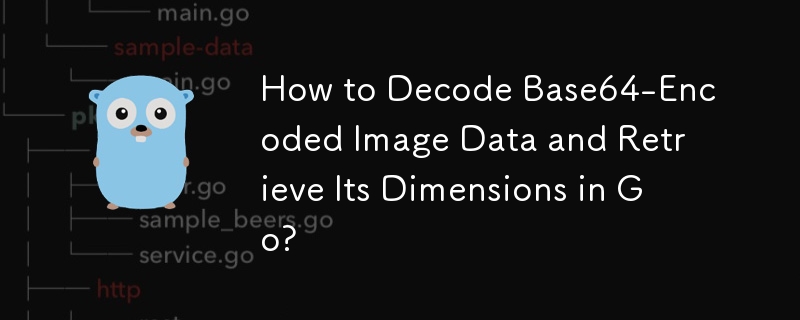 Backend Development
Backend Development
 Golang
Golang
 How to Decode Base64-Encoded Image Data and Retrieve Its Dimensions in Go?
How to Decode Base64-Encoded Image Data and Retrieve Its Dimensions in Go?
How to Decode Base64-Encoded Image Data and Retrieve Its Dimensions in Go?

Decoding Go Base64 Image Data
Problem:
You're receiving a Base64-encoded image data URL from a canvas and trying to decode it to retrieve its width and height, but you're encountering an "Unknown image format" error.
Solution:
The provided data URL format is a Data URI scheme, which includes additional information like the image type and Base64 encoding. To decode it properly, follow these steps:
import (
"encoding/base64"
"fmt"
"image"
_ "image/png" // Register the PNG format handler
"strings"
)
func decodeBase64Image(dataURL string) (image.Config, error) {
// Remove the prefix (e.g., "data:image/png;base64,")
base64Data := dataURL[strings.IndexByte(dataURL, ',')+1:]
// Decode the Base64-encoded image data
decoded, err := base64.StdEncoding.DecodeString(base64Data)
if err != nil {
return image.Config{}, fmt.Errorf("could not decode Base64 data: %w", err)
}
// Decode the image configuration
return image.DecodeConfig(bytes.NewReader(decoded))
}By registering the PNG format handler (_ "image/png"), you enable the image.DecodeConfig() function to properly decode the image data. You can also use the png.DecodeConfig() function directly if you know the image format.
Avoidance of Prefix Replacement:
Instead of replacing the prefix with an empty string, slice the input string to extract the Base64-encoded data. This is a more efficient approach as it doesn't require copying the entire string in memory.
base64Data := input[strings.IndexByte(input, ',')+1:]
The above is the detailed content of How to Decode Base64-Encoded Image Data and Retrieve Its Dimensions in Go?. For more information, please follow other related articles on the PHP Chinese website!

Hot AI Tools

Undresser.AI Undress
AI-powered app for creating realistic nude photos

AI Clothes Remover
Online AI tool for removing clothes from photos.

Undress AI Tool
Undress images for free

Clothoff.io
AI clothes remover

Video Face Swap
Swap faces in any video effortlessly with our completely free AI face swap tool!

Hot Article

Hot Tools

Notepad++7.3.1
Easy-to-use and free code editor

SublimeText3 Chinese version
Chinese version, very easy to use

Zend Studio 13.0.1
Powerful PHP integrated development environment

Dreamweaver CS6
Visual web development tools

SublimeText3 Mac version
God-level code editing software (SublimeText3)

Hot Topics
 What are the vulnerabilities of Debian OpenSSL
Apr 02, 2025 am 07:30 AM
What are the vulnerabilities of Debian OpenSSL
Apr 02, 2025 am 07:30 AM
OpenSSL, as an open source library widely used in secure communications, provides encryption algorithms, keys and certificate management functions. However, there are some known security vulnerabilities in its historical version, some of which are extremely harmful. This article will focus on common vulnerabilities and response measures for OpenSSL in Debian systems. DebianOpenSSL known vulnerabilities: OpenSSL has experienced several serious vulnerabilities, such as: Heart Bleeding Vulnerability (CVE-2014-0160): This vulnerability affects OpenSSL 1.0.1 to 1.0.1f and 1.0.2 to 1.0.2 beta versions. An attacker can use this vulnerability to unauthorized read sensitive information on the server, including encryption keys, etc.
 Transforming from front-end to back-end development, is it more promising to learn Java or Golang?
Apr 02, 2025 am 09:12 AM
Transforming from front-end to back-end development, is it more promising to learn Java or Golang?
Apr 02, 2025 am 09:12 AM
Backend learning path: The exploration journey from front-end to back-end As a back-end beginner who transforms from front-end development, you already have the foundation of nodejs,...
 What libraries are used for floating point number operations in Go?
Apr 02, 2025 pm 02:06 PM
What libraries are used for floating point number operations in Go?
Apr 02, 2025 pm 02:06 PM
The library used for floating-point number operation in Go language introduces how to ensure the accuracy is...
 What is the problem with Queue thread in Go's crawler Colly?
Apr 02, 2025 pm 02:09 PM
What is the problem with Queue thread in Go's crawler Colly?
Apr 02, 2025 pm 02:09 PM
Queue threading problem in Go crawler Colly explores the problem of using the Colly crawler library in Go language, developers often encounter problems with threads and request queues. �...
 How to specify the database associated with the model in Beego ORM?
Apr 02, 2025 pm 03:54 PM
How to specify the database associated with the model in Beego ORM?
Apr 02, 2025 pm 03:54 PM
Under the BeegoORM framework, how to specify the database associated with the model? Many Beego projects require multiple databases to be operated simultaneously. When using Beego...
 In Go, why does printing strings with Println and string() functions have different effects?
Apr 02, 2025 pm 02:03 PM
In Go, why does printing strings with Println and string() functions have different effects?
Apr 02, 2025 pm 02:03 PM
The difference between string printing in Go language: The difference in the effect of using Println and string() functions is in Go...
 What should I do if the custom structure labels in GoLand are not displayed?
Apr 02, 2025 pm 05:09 PM
What should I do if the custom structure labels in GoLand are not displayed?
Apr 02, 2025 pm 05:09 PM
What should I do if the custom structure labels in GoLand are not displayed? When using GoLand for Go language development, many developers will encounter custom structure tags...
 How to solve the user_id type conversion problem when using Redis Stream to implement message queues in Go language?
Apr 02, 2025 pm 04:54 PM
How to solve the user_id type conversion problem when using Redis Stream to implement message queues in Go language?
Apr 02, 2025 pm 04:54 PM
The problem of using RedisStream to implement message queues in Go language is using Go language and Redis...





